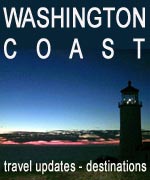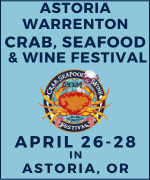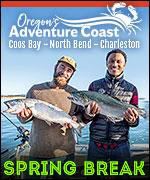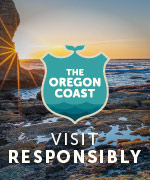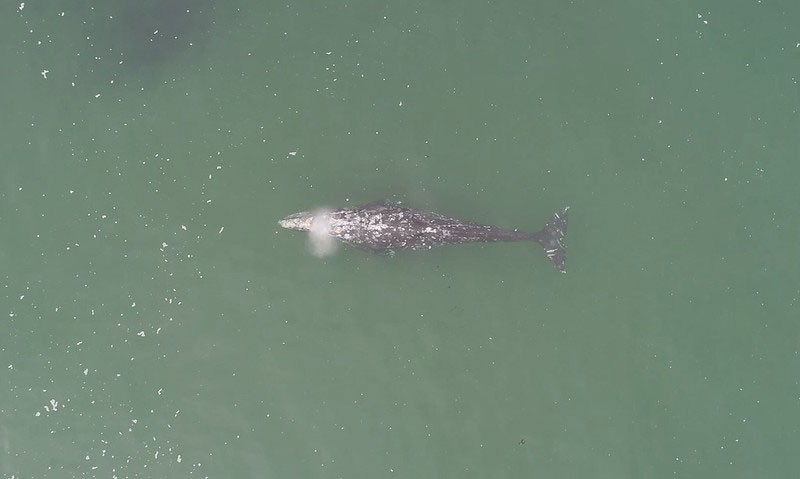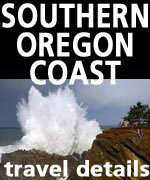Deceased N. Oregon Coast Gray Whale Likely Tied to Larger Issue of Unusual Mortality Events
Published 07/13/22 at 10:59 PM PST
By Oregon Coast Beach Connection staff
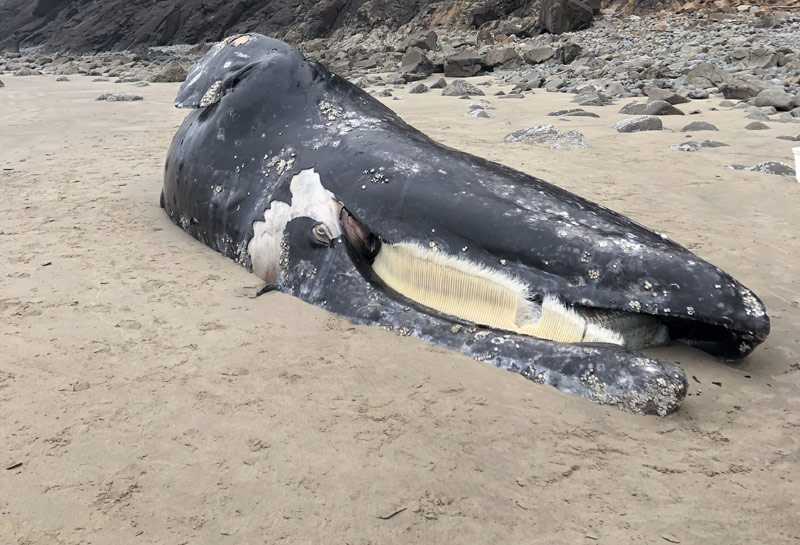
Includes exclusive listings; some specials in winter
In Cannon Beach:
Includes rentals not listed anywhere else
In Manzanita, Wheeler, Rockaway Beach:
Some specials for winter
In Pacific City, Oceanside:
Some specials for winter
In Lincoln City:
Some specials for winter
In Depoe Bay, Gleneden Beach:
Some specials for winter
In Newport:
Look for some specials
In Waldport
Some specials for winter
In Yachats, Florence
Some specials for winter
Southern Oregon Coast Hotels / Lodgings
Reedsport to Brookings, places to stay; winter deals
(Cannon Beach, Oregon) – Over the Fourth of July holiday weekend, a rather sad sight appeared for some residents on the north Oregon coast when the carcass of a large whale washed up. It stranded on a rather hidden area where most people either can't get to or don't know about: in the section of Falcon Cove that's immediately south of Arch Cape, a small village near Cannon Beach. (Photos courtesy Seaside Aquarium)
What Oregon coast researchers found was a 43-foot male gray whale, landing on July 1. With some testing able to be done on scene, it was largely like most deceased whale strandings – except that it seems to have a link to a trend in the gray whale population that is worrying experts.
In these cases, the Marine Mammal Stranding Network responds to such situations, and usually that's Seaside Aquarium in this area. However, due to the busy holiday weekend, the network sent out one of their scientists from Portland State University's Biology Department: Dalin D'Alessandro. She was able to perform a partial necropsy, she told Oregon Coast Beach Connection.
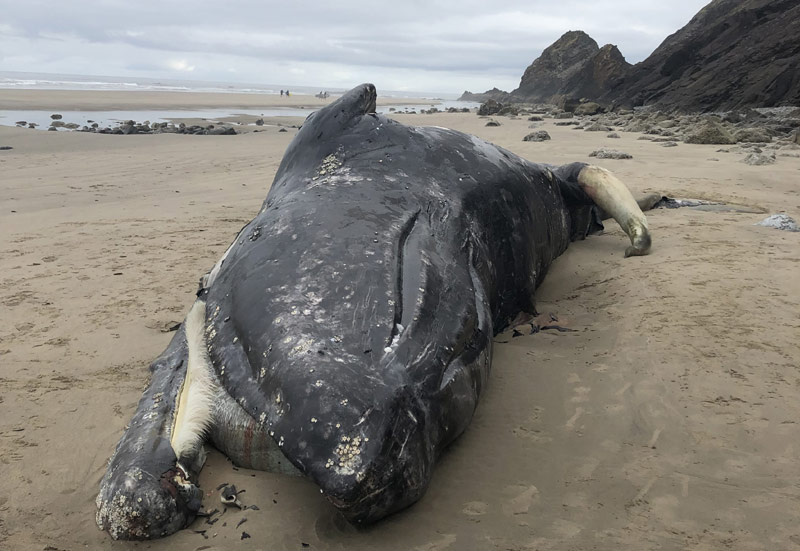
“The whale was decomposed, so only a few tissue samples were collected,” D'Alessandro said. “Preliminary findings showed evidence of malnourishment. However, final results from the partial necropsy are still pending.”
This is part of something being seen for a few years now: what's been nicknamed “skinny gray whales,” but technically known as an Unusual Mortality Event (UME). That was declared by National Oceanic and Atmospheric Administration's (NOAA) Fisheries back in 2019, D'Alessandro said.
How long the whale had been deceased out at sea wasn't possible to determine, though witnesses on scene described a pretty strong odor.
“That is always a difficult question to answer, as there are various factors involved that affect the rate of decomposition such as air and water temperature,” she said.
Much of the UME issue seems to stem from whales simply being undernourished, but of course there are whale deaths of other kinds. However, starting in 2019, a record number of deceased gray whales started washing ashore on Pacific Northwest beaches, including California, British Columbia and the Oregon coast and Washington coast. Many of them were visibly undernourished.
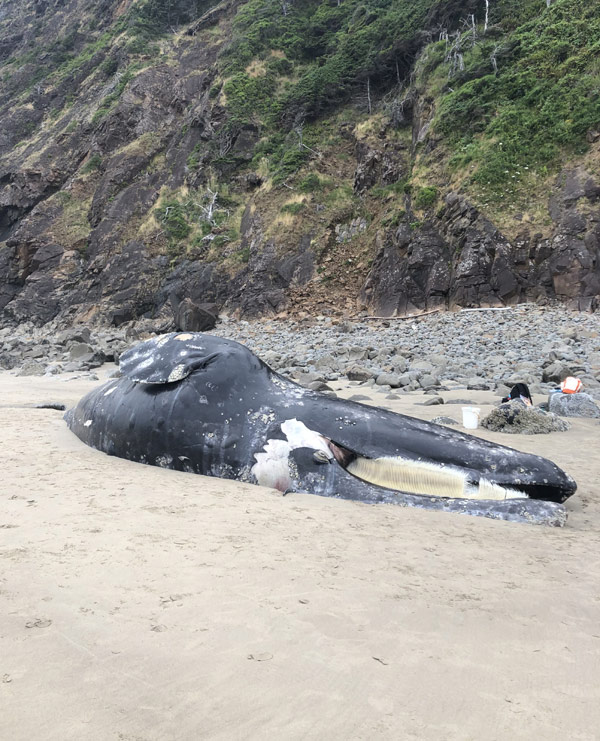
On the U.S west coast, some 122 UME's were reported in 2019. That number dropped considerably over the next two years, however. This brings some hope, but then the issue and the numbers are more complex than that.
According to Oregon State University / Hatfield Marine Science Center scientist Leigh Torres, there are also fewer whales out there than before.
“Yes, there was some improvement, but fewer whales in the last couple years than previously,” Torres said.
A smaller whale population also means less of them washing up after dying.
Even so, Torres and her colleagues followed nearly 200 whales by drone for three years. They found many whales in worsening condition, primarily that they were skinnier in many cases. This coincided with many whale stranding finds along the Pacific Northwest where the deceased whales were poor in weight.
Torres and her fellow researchers told Oregon Coast Beach Connection the health of whales were in decline not long after periods of poor upwellings – that ocean process that brings colder water to the surface and contains the nutrients whales consume.
Essentially, their food sources are at the heart of the issue, and climate change is likely driving much of that.
It is as yet unknown how the whale will be disposed of.
Oregon Coast Hotels in this area - South Coast Hotels - Where to eat - Maps - Virtual Tours
Cannon Beach Lodging
Nehalem Bay Lodgings
Manzanita Hotels, Lodging
Three Capes Lodging
Pacific City Hotels, Lodging
Lincoln City Lodging
Depoe Bay Lodging
Newport Lodging
Waldport Lodging
Yachats Lodging
Oregon Coast Vacation Rentals
Oregon Coast Lodging Specials
Photo courtesy OSU: "skinny whale" photographed by drone
More About Oregon Coast hotels, lodging.....
More About Oregon Coast Restaurants, Dining.....
LATEST Related Oregon Coast Articles
A good show from Washington southward but some deadly possibilities. Weather
Highway 6 to Oregon Coast Declared an Emergency Situation by Washington County
The move will hopefully initiate federal assistance. Traffic. Tillamook, Portland, Hillsboro, Oceanside, Pacific City
State Parks Dept Wants Input on New Drone Rules for Inland Oregon, Coast
Public input: rules would affect where drones can take off, land. Safety
Last Night's Aurora Shots from Oregon Coast
A strong storm seen from Newport, Bandon, Port Angeles, Florence, Pacific City, Cannon Beach and more. Astronomy. Sciences
McMinnville Oregon Weather - Forecasts, Sky Cams, Alerts, Current Conditions
Weather forecasts, live sky cams, alerts and current conditions for McMinnville, Oregon. Portland, Hillsboro, Tualatin
N. Oregon Coast's Highway 6: Why It Was Abruptly Closed for the Day This Weekend
A new roadway arose with more sunken asphalt. Traffic
Bandon in 2026: Dates for Circles in the Sand and the S. Oregon Coast's Rugge...
Circles in the Sand April?August; Tour de Fronds on June 20. Bandon events
Florence's Wine, Chowder and Glass Float Trail Takes Over Oregon Coast Town, ...
15 wineries, 12 chowder-makers and more. Florence events
Back to Oregon Coast
Contact Advertise on Oregon Coast Beach Connection
All Content, unless otherwise attributed, copyright Oregon Coast Beach Connection. Unauthorized use or publication is not permitted





